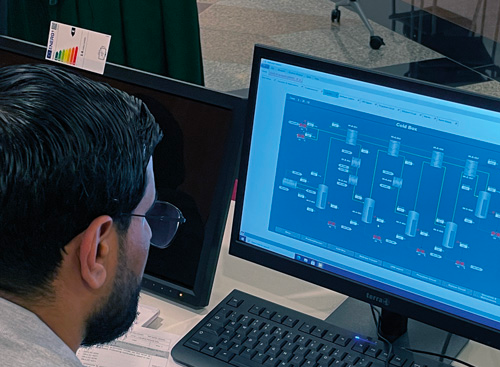Products and Applications
Standalone software applications, and extensions for commercial process simulators.

Commercial Process Simulators provide generic functionality to serve the widest possible range of customers and applications with a standard tool. This can present challenges in incorporating your own industry specific expertise and requirements. Our Services Engineers Team helps your business by integrating your know-how and your tools into the major Commercial Process Simulator Softwares, thereby streamlining the workflow and usage: Inprocess’s Software Developers have extensive experience in building customised Property Packages and customised Unit Operations for the major commercial Process Simulators using proprietary interfaces as well as open standards such as CAPE-OPEN, both in Steady State and Dynamic Process Simulation.
Inprocess also commercializes standalone software applications which help clients to improve the quality and the quantity of their work: With Inprocess Infrastructure Suite (IIS) all our OTS can be customized to cover any client need; with ITOP plant operators and even Chem. Eng. undergraduates can get insights into how equipment in a producing plant actually works; with INGENO both operators and engineers can get insights into the processes and the auxiliary systems of interest using generic Operator Training Simulators; with ICOM it is possible to set up a system capable of training operators and also managing the competencies they acquire; and with IFLOW it is possible to link the transient simulation of multi-phase pipelines with the dynamic simulation of Oil&Gas processing plants.
Products

INGENO: Inprocess Generic Operator Training Simulators
Inprocess’ INGENO is the collection of generic OTS, for the hydrocarbon and chemical processing industries, based on first-principles dynamic process simulators.

IIS: Inprocess Infrastructure Suite
The Inprocess Infrastructure Suite (IIS) is the backbone of many Inprocess solutions: Operator Training Simulators, on-line digital twins, simulation models linking, cloud installation, process trainers etc. IIS extends the usability and applicability of process simulation models by incorporating functionalities like…

ITOP: Inprocess Training for Operators
Today, one of the most critical concerns in the process industry is to maintain and improve the know-how required to safely and efficiently operate the process plants. ITOP is a new approach for training operators and young engineers in subjects like Process Engineering and Unit Operations. This approach combines process simulation based exercises with classroom training, and motivates the attendees to experience complex theories through hands-on exercises.

IFLOW – To link process and pipeline dynamic simulations
The Inprocess IFLOW software, which links the results from a dynamic process simulator with the ones from Schlumberger\’s dynamic pipeline simulator, OLGA, is implemented as an extension in the process simulator, and provides a rigorous insight into the dynamic interactions between the multiphase production system and the processing facilities
IFLOW uses the OLGA OPC sever to send and receive data to/from the process simulator.
IFLOW allows for flow assurance studies and other problems to be investigated:

ICOM: Inprocess Competence Management System
ICOM is a powerful software tool aimed at managing, expanding and confirming the proficiency of your workforce, specifically the operators in the chemical and hydrocarbon processing industries.

ILIB: Inprocess Library of Training Modules
ILIB is the collection of Training Modules on Process Simulation and related subjects that have been developed and maintained by Inprocess experts over the last 25 years, with learning content focused on helping corporations to develop and increase the skills of their engineering workforce in the Process Simulation field of knowledge.

Extensions for Process Simulators
Inprocess’s Software Developers have extensive experience in building customised Property Packages and customised Unit Operations for the major commercial Process Simulators using proprietary Process Simulator interfaces as well as open standards such as CAPE-OPEN, both in Steady State and Dynamic Process Simulation.


